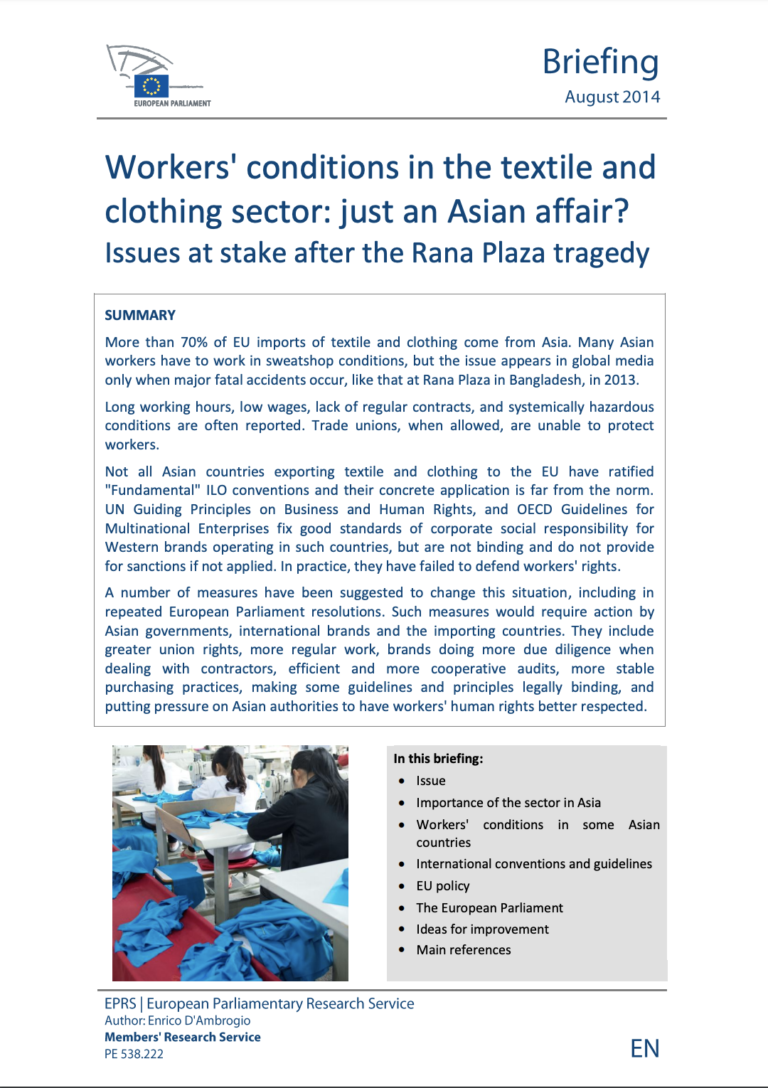Guiding Principles on Business and Human Rights
The UN Guiding Principles on Business and Human Rights are a set of guidelines for States and companies to prevent, address and remedy human rights abuses committed in business operations. child labour
Written by Enrico D’Ambrogio
More than 70% of EU imports of textile and clothing come from Asia. Many Asian workers have to work in sweatshop conditions, but the issue appears in global media only when major fatal accidents occur, like that at Rana Plaza in Bangladesh, in 2013.
Long working hours, low wages, lack of regular contracts, and systemically hazardous conditions are often reported. Trade unions, when allowed, are unable to protect workers.
Not all Asian countries exporting textile and clothing to the EU have ratified “Fundamental” ILO conventions and their concrete application is far from the norm. UN Guiding Principles on Business and Human Rights, and OECD Guidelines for Multinational Enterprises fix good standards of corporate social responsibility for Western brands operating in such countries, but are not binding and do not provide for sanctions if not applied. In practice, they have failed to defend workers’ rights.
A number of measures have been suggested to change this situation, including in repeated European Parliament resolutions. Such measures would require action by Asian governments, international brands and the importing countries. They include greater union rights, more regular work, brands doing more due diligence when dealing with contractors, efficient and more cooperative audits, more stable purchasing practices, making some guidelines and principles legally binding, and putting pressure on Asian authorities to have workers’ human rights better respected.

The UN Guiding Principles on Business and Human Rights are a set of guidelines for States and companies to prevent, address and remedy human rights abuses committed in business operations. child labour
The OECD Guidelines for Multinational Enterprises are recommendations addressed by governments to multinational enterprises operating in or from adhering countries. They provide non-binding principles and standards for responsible business conduct in a global context consistent with applicable laws and internationally...
This Inter-Agency Coordination Group against Trafficking in Persons (ICAT) Issue Brief explains the role of public procurement in preventing trafficking for forced labour. It outlines the international and national policy framework; elaborates on va...Read More
The data in this report represents signals and cases from January 1, 2017 through December 31, 2017 and is accurate as of July 11, 2018. Cases of trafficking may be ongoing or new information may be revealed to the National Hotline over time. Conseq...Read More
by Andy Shen and Abby McGill, ILRF International Labour Rights Forum (ILRF) launched the Independent Monitoring at Sea (IM@Sea) project to address some of the vulnerabilities of migrant workers in the Thai fishing fleet by enabling worker connectivi...Read More
This toolkit, jointly developed by STOP THE TRAFFIK and Shiva Foundation, seeks to provide practical guidance for small and medium-sized enterprises (SMEs) on how they can prevent modern slavery in their business operations. We recognise that many u...Read More